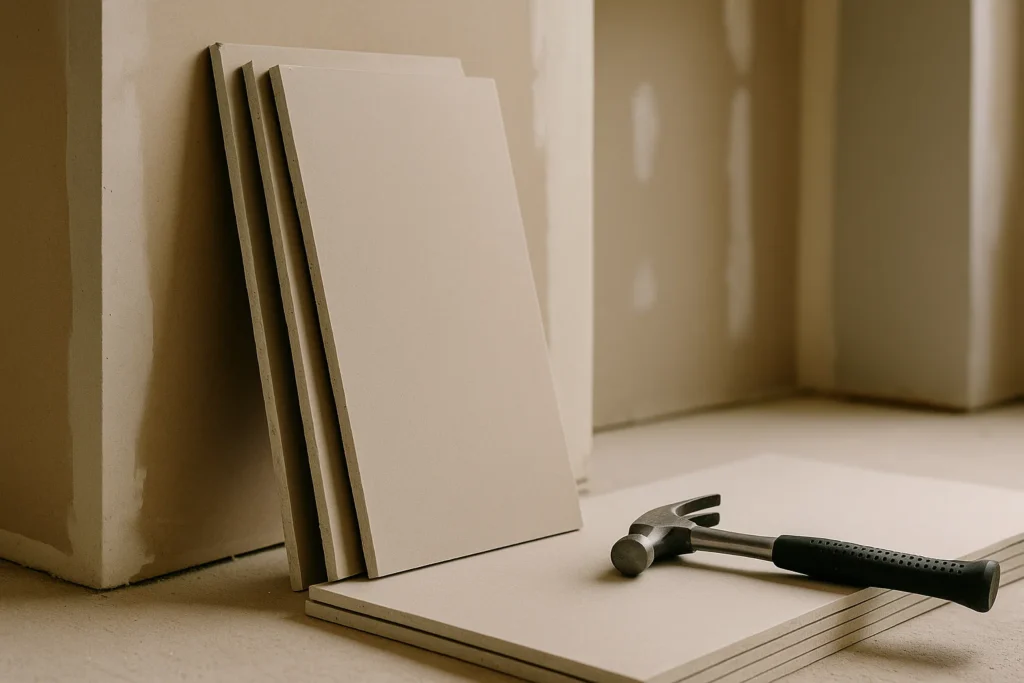To be honest, when it comes to home renovation projects or constructions, I bet you have come across the term Sheetrock and drywall being used several times. And in case you are wondering why these two terms are being used interchangeably, you are not alone. As a matter of fact a number of people use these terms on the same meaning without having any idea of what distinguishes each of them or whether one is superior over the other.
Here is what is what as far as I am known. After you complete reading this, not only will you know what distinguishes one material from the other, but also, you will be well guided and placed to make the right decision in selecting the right material to use in your project.
Basic Understanding of Drywall and Sheetrock
What Exactly is Drywall?
To begin with, drywall is one of the types of building material which is utilized to produce the interior walls and ceilings within homes and buildings. It surrounds you – you most likely have drywall in the walls of just about every house you have ever been in.
Drywall simply consists of gypsum plaster which is a soft mineral that is sandwiched in between two thick papers. It can be thought of as a sandwich panel of a durable nature.
Drywall is available in common sizes of 4 feet wide by 8 feet high, and various thicknesses as needed, 1/4 to 1/2 inch, typical in non residential applications:
- Curved walls or ceilings can be applied with thinner drywall ( 9 inch).
- Residential walls are usually of standard thickness ( 1/2 inch ).
- Drywall that is thicker (⅝ inch) may be fire-rated and placed in a garage or commercial structure.
There are also other types such as moisture resistant drywall (best in the bathroom and the kitchen) and soundproof drywall that are there so that you may feel a bit quieter.
So, really what we are talking about is drywall is simply just one type of material amongst building favorites which has multiple forms and multiple grades.

What’s Sheetrock
The twist of this is the fact that Sheetrock is just a brand name. It is the brand name that is registered by the USG Corporation to its own brand of drywall products.
Therefore, every drywall is Sheetrock but not vice versa. It can be thought of in this way; all Kleenex, but not all tissues, are tissues. The same thing is true here
The thing that all sets Sheetrock above and beyond the others, though, is some of the unusual components USG adds to its drywall. As an example, Sheetrock is often more dense in that the core tends to contain added fibers of wood to make it stronger and more resistant to impact. This can make Sheetrock a higher grade and stronger than the prices of other cheap brands of drywall.
Despite the fact that Sheetrock is a high-grade drywall, it remains, at its roots, drywall nonetheless. When one says, I want to use Sheetrock, what he usually means is that he wants a high quality and reliable drywall product offering him trust.
Key Differences Between Sheetrock and Drywall
Here are the main features that cause a difference between both. This table will helps to have a quick understanding:
| Feature | Sheetrock | Drywall |
| Brand | Trademarked by USG Corporation | Generic term for gypsum board |
| Composition | Gypsum core with wood fibers added | Gypsum core without wood fibers |
| Quality | Generally higher quality, consistent | Varies widely by manufacturer |
| Fire Resistance | Often fire-rated versions available | Varies; many fire-resistant types |
| Strength & Durability | Denser core, better impact resistance | Quality varies, standard and specialty types |
| Cost | Usually more expensive (brand premium) | Generally more cost-effective |
Take a look at how Sheetrock generally has a little brand premium? It almost is the equivalent of purchasing designer wardrobe instead of off a rack; you are paying a premium price to guarantee quality, standardisation, and in many cases on materials.
Which One’s Better? The Factors You Should Think About
This is where the real hard part comes in. The question of which is better, in reality, depends on what you need, what your budget is and what your project requirements are. So, this is a briefed insight of the most crucial factors:
Cost
Usually, sheetrock is more expensive. When your project is big and you have to watch your budget, generic might be the answer to drywall because you save your cash but cheaper does not always mean low quality. Good brands of drywall can be found aplenty.
Durability
The solid core of sheetrock is thicker, and wood fibers are added to the interior, which gives the product more strength and resistance to impacts. In other words, it will not be prone to denting or cracking when hit.
Fire Resistance
Sheetrock, as well as drywall, is available in fire-rated models. However, Sheetrock frequently deals with more high-end fire resistance panels being used on the exterior of new buildings or the interior of garages.
Installation
More or less similar in both, because they both employ similar screws and joint compounds. According to some pros, it is also easy to work with Sheetrock panels due to their consistency in terms of thickness and quality.
Moisture Resistance
Basements, kitchens, and bathrooms should have moisture-resistant drywall to minimize the chances of molds. The two brands are available in water-resistant models, and the core of Sheetrock may absorb slightly less moisture.
Environmental Impact and Air Quality
This is a trivial distinction, but Sheetrock states that the air in and around buildings using them is more environmentally friendly to source and the shop has a safer indoor air quality since it is less dusty when installing it.
Building Codes
There are also specifications on the type of fire-rated drywall listed in some local codes both by Sheetrock, and other drywall manufacturers.
Busting Common Misconceptions About Sheetrock and Drywall

These are some of the myths we can clear up at once:
Sheetrock and drywall are completely different materials: Nope! Sheetrock is only one of the brands of the trustful drywall.
Generic drywall means cheap and low-quality: Not always! There are good and nice brands of dry walls, which can be used in all the building codes. It is all a matter of who your supplier is and what you want.
You have to use Sheetrock to get the best results: Not true. There are good quality brands of drywall which are being used by many professionals and when fitted in the right manner you can have sensational results.
Sheetrock is only for professionals or big projects: In fact, a lot of homeowners purchase and apply Sheetrock with no problem into making a DIY product.
When Should You Use Sheetrock vs Drywall?
But when should you choose one or the other? It is simple as follows:
Choose Sheetrock if:
- You are seeking high-quality that is more durable and with a few degrees of elevated fire resistance.
- The location of your project is high traffic with walls bearing much wear and tear.
- You like brand-name security and used-to-it quality.
- You are pouring commercial or tough residential builds.
Choose Drywall if:
- You have a limited budget and you need to strike the balance between the cost and the quality.
- The project is not as strenuous, such as interior walls in rooms where there is not a great concern with impacts.
- You desire a specialty board (such as moisture or sound-resistant) and also you can access brands you believe.
Bathrooms, Kitchens and Damp: Seek out moisture resistant varieties of drywall that were specifically designed to work in wet applications (both Sheetrock and other drywall brands have a version of these in the form of moisture resistant varieties).
In the case of Fire Safety Requirements: Test the local building codes and make your choice between fire-rated boards either Sheetrock or other brand of a fire-rated dry-wall.
Quick Installation Tips to Keep in Mind
Regardless of which product you use Sheetrock or drywall, some practical ideas will make the process go more smoothly:
- Apply the correct screws and fasteners depending on the thickness of drywall made a decision on.
- Meet your local building requirements on moisture and fire resistance.
- Sheets of drywall that are damaged are often replaced like-for-like, but when this is done, it is worth spending a little extra money to upgrade to a higher-grade product, such as Sheetrock to increase durability.
- Always do the taping, mudding, sanding of the joints in order to get that smooth professional look.
Conclusion
Sheetrock is effectively a quality branded drywall that has a couple of production incentives that develop fire resistant and long-lasting properties. There can be a peace of mind that comes along with the decision of Sheetrock when you wish to be assured of uniform quality along with a little bit of extra expenditure.
Drywall, on the other hand, is a more general term and you can find some super products that are not Sheetrock but that will still get the job done quite as well, -particularly in the case of selecting the kind that best suits your particular job requirements.
However, it ultimately comes down to your budget, project needs, and municipal codes that regulate building to determine which option is best. And by the way, when it comes to doubt, you might as well talk to a expert contractor like Neimann Painting to go for the best option.
FAQs
A high-end brand of dry wall, sheetrock has a denser core and tend to be more impact and fire resistant, thus more durable on average. Yet, the normal drywall of other suppliers can also be of good quality and appropriate on most projects when you need it based on requirements and funds.
Drywall is generally less expensive as it is a generic term and describes a large type of gypsum board manufactured by different companies whereas, Sheetrock is a proprietary brand and subject to a brand premium, and can be more expensive. In case of price sensitivity generic brands of drywall may be available of good quality at a lower price.
Branding or marks may be on the back of the wall panel; Sheetrock panels will have the USG Corporation trademark and product details printed on them. It is most likely generic drywall, however, visually, and with regard to functionality, they are practically identi

